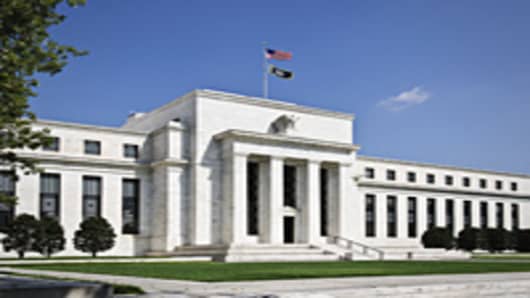With the U.S. economy stuck in a rut, some have called for further action from the U.S. Federal Reserve. The hope is that the Fed will start its bond buying again, formally known as quantitative easing or QE3.
To “Mad Money” host Jim Cramer, though, QE3is not likely to get the U.S. economy get out of its funk. In fact, he thinks the very idea is the “height of silliness.”
After all, investors around the world are flocking to “safe assets,” including Treasury bonds. In turn, investors are sending rates lower than the Fed ever could, Cramer said. The 10-year Treasury bondnow yields around 1.4 percent and could fall further.
The rates are already low enough to tempt people to borrow, Cramer said, meaning the Federal Reserve's job is already done. The Fed’s stated goal was to have assets go from weak hands to strong ones, particularly in the housing market. Today, the housing market in many troubled areas continues to improve, including in parts of Florida, California and Arizona. Las Vegas is the only troubled market that has yet to participate in the housing recovery, he noted.
“In fact, if you have the money for a down payment and you can afford to do some real estate investing, now’s the time because with thee low rates, you can rent out the property and clear a huge amount of cash each month, much better than any bond,” Cramer said.
Meanwhile, Cramer noted that banks make for lousy investments in the U.S. because they need to have some inflection in the yield curve to make real money. In other words, banks need to be able to lend out at higher rates, but they’re not able to given that all loans are priced off of Treasurys.
“If anything, not only should the Fed not be buying, but the Treasury should be selling,” Cramer said. “If the Treasury department somehow took advantage of these low rates to refinance short-term money with long-term capital, it could eliminate any potential liquidity crunch we might have in the not so distant future, something we all know can happen if the government has to borrow at high short-term rates once the bond vigilantes set their sights on the U.S.”
While Cramer thinks the Fed’s bond buying has worked overall, he doesn’t think it can work at lower rates. It was successful in stimulating residential buying, for example, but hasn’t ignited commercial construction borrowing, he said. Business leaders simply lack confidence given worries about tax changes in the U.S., not to mention Europe’s debt crisis. The Fed can’t control those things, though.
Cramer thinks it’s important to pay attention to Fed Chairman Ben Bernanke's comments later this week, but reminded viewers to recognize that the bond buyers have done his bidding and then some. He thinks it’s now up to Congress to try and restore confidence, or Europe must solve its debt crisis, or China can get its economy cooking again.
So what’s the bottom line? To Cramer, the Fed is not the answer. The U.S. government should be a seller of debt, not a buyer.
Call Cramer: 1-800-743-CNBC
Questions for Cramer? madmoney@cnbc.com
Questions, comments, suggestions for the Mad Money website? madcap@cnbc.com



